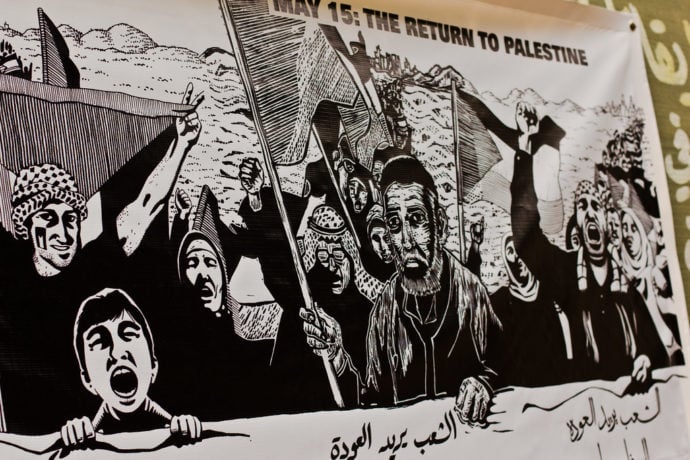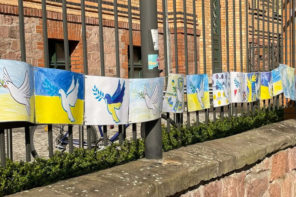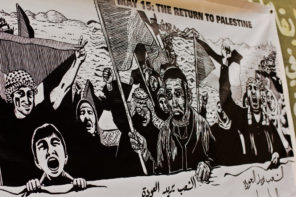The title of this statement is a direct quote from Gazan-based journalist Muhammad Smiry, who took footage of how people in Palestine recharge their phones and cameras on solar power so that they can continue to document the ethnic cleansing happening before their eyes at this very moment.
We are a group of students from EHESS, the School for Advanced Studies in Social Sciences in Paris. Our institution has issued one statement after the Hamas attack in occupied territories that happened on the 7th of October 2023, and then another one after the killing of professor Dominique Bernad in Arras. Since then, it has not only remained silent about the constant and murderous bombing on the Gaza strip, but has also silenced the emerging voices, mostly from students and precarious workers such as PhDs and members of the Solidaires Union at EHESS, that were calling out the double standards of the institution.
As students in the field of the Environmental Humanities, we want not only to speak out about the ongoing occupation of Palestine, but also underline how crucial it is to denounce this genocide, to discuss it in our classes, to collaborate with Palestinian academics so as to amplify their voices and truly decolonize our institutions.
Naomi Klein was right in 2016 when she asked environmentalists to read more, and with more attention, Edward Said’s writings, who once described environmentalism as “the indulgence of spoiled tree huggers who lack a proper cause.” That is not the kind of environmentalists that we aspire to be, and that is why we are stepping up. As students in the Environmental Humanities, we need to acknowledge that Zionist politics perpetuates environmental racism and green colonialism in Palestine. Occupation, displacement, and the ethnic cleansing of indigenous communities proceeds at the same time as the extractivism of natural resources and the destruction of the ecosystem. With her text, Klein reminds us that the history of colonialism is tightly intertwined with the current multiscale ecological crises driven by fossil fuels companies, particularly in the SWANA region.
On the other hand, anthropologist Ruba Salih argues that Frantz Fanon’s analysis of colonial violence should also be applied to the ongoing genocide in Palestine, as it would help us seize the measure of Palestinian generational physical and psychological trauma, and most importantly to recognize that the only hope to end the cycle of violence in the region is to end the apartheid and the occupation.
On October 9th, Israeli Defense Minister Yoav Gallant in a public speech declared : “We [the Israeli] are fighting human-animals, and we are acting accordingly”. This sentence also reminds us of the words of Fanon, who in The wretched of the Earth wrote that the colonizer ” (…) dehumanizes the native, or to speak plainly, it turns him into an animal. In fact, the terms the settler uses when he mentions the native are zoological terms. He speaks of the yellow man’s reptilian motions, of the stink of the native quarter, of breeding swarms, of foulness, of spawn, of gesticulations. When the settler seeks to describe the native fully in exact terms he constantly refers to the bestiary”. This language allows the colonizer to “adventure, conscience in peace, in the unlimited discovery of new means of terror” (Fanon; 2011).
As Israeli historian Ilan Pappé has extensively demonstrated in his works (2017), Israeli policies are a guidebook for how to commit crimes without facing any consequence. We have witnessed this capacity over the past 75 years, culminating in the dramatic escalation of these past weeks, when Gaza has been constantly bombarded, and the West bank has also been under attack (settlers, directly armed by the Israeli government, have been given a license to kill).
More specifically, we want to highlight:
- How the Israeli government is gatekeeping vital resources such as water, food and fuel making it impossible for Palestinian civilians to perform rescue operations, by disrupting the functioning of hospitals, ambulances and excavators.
- How the state of Israel is built on the unequal distribution of natural resources (Hannah Boast; 2020), spatial segregation (Eyal Weizman and Rafi Segal; 2003) and apartheid, as stated by the UN (2007, 2022), Amnesty International (2022) and Human Rights Watch (2021).
- How the Israeli President and other public figures dehumanize Palestinian people, calling them “human-animals” and using the dangerous language of “light against darkness”, opposing a good side to an evil and barbaric one, referring to the biblical figure of Amalek. These terms are not only clearly arabophobic and Islamophobic: historically they also represent the linguistic premises to committing genocide as defined by the UN 1948 Convention.
- How Israel acted in environmental politics to make a “forest out of the desert” by implanting invasive species such as pines on Palestinian lands and cultivating the widespread imaginary of ‘terra nullius’ (Boast, 2012; Diana K. Davis, 2016; Henni, 2022).
- How the Israeli state reinforced his presence by erasing historical and sacred sites such as the Mamilla Cemetery in Jerusalem (upon which, the “Museum of Tolerance” was sadistically erected) and attacking worshippers at Al Aqsa Mosque in April 2023. The erasure of the Palestinian cultural heritage is fundamental to understanding the ethnic cleansing of these people.
- How the Israeli army imprisons and tortures Palestinian people, often without a fair trial (the so called “administrative detention”) and condones the kidnapping and lynching of Palestinian bodies by Israeli settlers (such as in the case of 16 years old Mohammed Abu Khdeir).
- How Israel relentlessly cut native olive trees, in an effort to impoverish and uproot Palestinians families and farmers (Braverman; 2009).
- How it bombarded and destroyed civil infrastructures, polluting the land and the sea, making the air unbreathable by using white phosphorus bombs, as demonstrated by Amnesty International.
- How it pursues a policy of censorship (as in the case, among many others, of filmmaker Mohammad Bakri and of Al-Jazeera journalist Wael Al-Dahdouh, whose family was intentionally killed) and propaganda, as we have seen on our national television channels in the past weeks. As an example, the ex-Israeli ambassador in Italy Dror Eydar said on Italian television that the ultimate goal for Israel is to “destroy Gaza” and “kill everyone who is a threat to Jews all over the world”.
- How Israel pursues the de-infantilization of Palestinian children: the age of imprisonment was lowered to 12 years old in 2016 and more than three thousand children have been killed over a three weeks period, while the Israeli far-right television channel 14 described them as “terrorists killed” (מחבלים שחיסלנו). We can observe similar policies of de-infantalization of marginalized communities in Europe, as denounced by activists such as Fatima Ouassak (2020) in France, where children from working class districts are racially profiled by the police because they are perceived as dangerous and threatening troublemakers. We can’t help but remember that the recent killing of the teenager Nahel Merzouk by a policeman in Nanterre last June is the tragic result of these kinds of policies.
Former Vice President of the UN Correspondents Association Mark Seddon asked Samah Jabr, a Palestinian psychiatrist and author of the 2018 book and documentary Derrieres les fronts), “How do you bring together people now, I would not know”, to which she responded: “The answer to this big question is simple: imposing human rights, justice, dignity for everybody. Then there will be no need for anger, hatred and violence”. As Gilles Deuleuze explained in the Abécédaire interview series, Palestinians are in fact inevitably caught up in a revolutionary-becoming: “People in situations of tyranny and oppression are to enter in a revolutionary-becoming because there is nothing left to do”, he said.
Concerning the feminist movements of the ‘70, Ursula Le Guin once wrote that “There is a time for anger and that was such a time”. This is a time for anger, and a time for grief, but hope in a fairer future never dies, and that is the reason why Palestinians need our solidarity and our actions to resist oppression and fight for a better future, following the value of sumud (steadfast perseverance). This is the reason why we call out the President and faculty of the EHESS to take a clear position on this ethnic cleansing and express the same solidarity toward Palestinians as the one that was expressed toward Ukrainian academics and refugees. We are devastated by the many innocents who were murdered, and we fear for those who are still alive. We are not taking sides as if it were a football match, as some people advocating for “peace on both sides” are implying: the very meaning of the word “partisan”, as Gramsci wrote (1917-1918), is to take sides. In continuity with the anti-fascist tradition, we stand in solidarity with Palestine and call for a ceasefire.
A group of students and alumni in Environmental Humanities from EHESS in solidarity with Palestine
Bibliography
Braverman, Irus. “Uprooting Identities: The Regulation of Olive Trees in the Occupied West Bank”. PoLAR: Political and Legal Anthropology Review, 32: 237-264, 2009.
Davis, K. Diana. The Arid Lands: History, Power, Knowledge. Cambridge: The MIT Press, 2016.
Fanon, Frantz. The Wretched of the Earth. New York: Grove Press, 1968.
Fanon, Frantz. L’an V de la révolution algérienne. Paris: La Découverte, 2011.
Gramsci, Antonio. La città futura, 1917-1918. Torino: Einaudi, 1982.
Hannah Boast (2012) “‘Planted Over The Past’: Ideology and Ecology in Israel’s National Eco-Imaginary”, Green Letters, 16:1, p. 46-58.
Henni, Samia (ed.). Deserts Are Not Empty. New York: Columbia Books on Architecture and the City, 2022.
Le Guin, K. Ursula. No time to spare : thinking about what matters. Boston: Houghton Mifflin Harcourt, 2017.
Ouassak, Fatima. La puissance des mères: Pour un nouveau sujet révolutionnaire. Paris: La Découverte, 2022.
Pappe, Ilan. Ten Myths About Israel. London: Verso Books, 2017.






